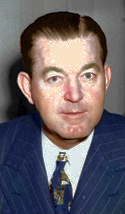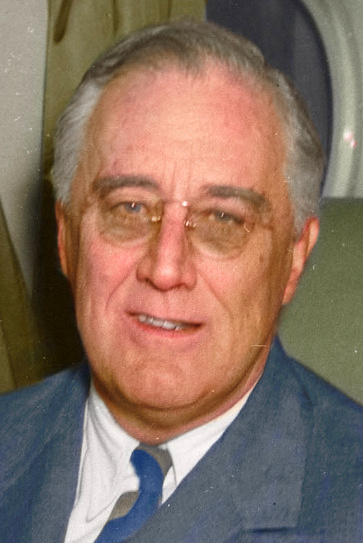Letter Asking if President Roosevelt Will Accept a Fourth Term Nomination
July 11, 1944
Dear Mr. President:
As Chairman of the Democratic National Committee, it is my duty on behalf of the Committee to present for its consideration a temporary roll of the delegates for the National Convention, which will convene in Chicago on July 19, 1944.
The National Committee has received from the State officials of the Democratic Party certification of the action of the State conventions, and the primaries in those States, which select delegates in that manner.
Based upon these official certifications to the National Committee, I desire to report to you that more than a clear majority of the delegates to the National Convention are legally bound by the action of their constituents to cast their ballots for your nomination as President of the United States. This action in the several States is a reflection of the wishes of the vast majority of the American people that you continue as President in this crucial period in the Nation’s history.
I feel, therefore, Mr. President, that it is my duty as Chairman of the Democratic National Committee to report to you the fact that the National Convention will during its deliberations in Chicago tender to you the nomination of the Party as it is the solemn belief of the rank and file of Democrats, as well as many other Americans, that the Nation and the world need the continuation of your leadership.
In view of the foregoing, I would respectfully request that you send to the Convention or otherwise convey to the people of the United States an expression that you will again respond to the call of the Party and the people. I am confident that the people recognize the tremendous burdens of your office, but I am equally confident that they are determined that you must continue until the war is won and a firm basis for abiding peace among men is established.
Respectfully,
ROBERT E. HANNEGAN
Letter from President Roosevelt Agreeing to Accept a Fourth Term Nomination
July 11, 1944
Dear Mr. Hannegan:
You have written me that in accordance with the records a majority of the delegates have been directed to vote for my renomination for the office of President, and I feel that I owe to you, in candor, a simple statement of my position.
If the Convention should carry this out, and nominate me for the Presidency, I shall accept. If the people elect me, I will serve.
Every one of our sons serving in this war has officers from whom he takes his orders. Such officers have superior officers. The President is the Commander in Chief and he, too, has his superior officer – the people of the United States.
I would accept and serve, but I would not run, in the usual partisan, political sense. But if the people command me to continue in this office and in this war, I have as little fight to withdraw as the soldier has to leave his post in the line.
At the same time, I think I have a right to say to you and to the delegates to the coming Convention something which is personal – purely personal.
For myself, I do not want to run. By next Spring, I shall have been President and Commander in Chief of the Armed Forces for twelve years – three times elected by the people of this country under the American Constitutional system.
From the personal point of view, I believe that our economic system is on a sounder, more human basis than it was at the time of my first inauguration.
It is perhaps unnecessary to say that I have thought only of the good of the American people. My principal objective, as you know, has been the protection of the rights and privileges and fortunes of what has been so well called the average of American citizens.
After many years of public service, therefore, my personal thoughts have turned to the day when I could return to civil life. All that is within me cries out to go back to my home on the Hudson River, to avoid public’ responsibilities, and to avoid also the publicity which in our democracy follows every step of the Nation’s Chief Executive.
Such would be my choice. But we of this generation chance to live in a day and hour when our Nation has been attacked, and when its future existence and the future existence of our chosen method of government are at stake.
To win this war wholeheartedly, unequivocally, and as quickly as we can is our task of the first importance. To win this war in such a way that there be no further world wars in the foreseeable future is our second objective. To provide occupations, and to provide a decent standard of living for our men in the armed forces after the war, and for all Americans, are the final objectives.
Therefore, reluctantly, but as a good soldier, I repeat that I will accept and serve in this office, if I am so ordered by the Commander-in-Chief of us all – the sovereign people of the United States.
Very sincerely yours,
FRANKLIN D. ROOSEVELT

